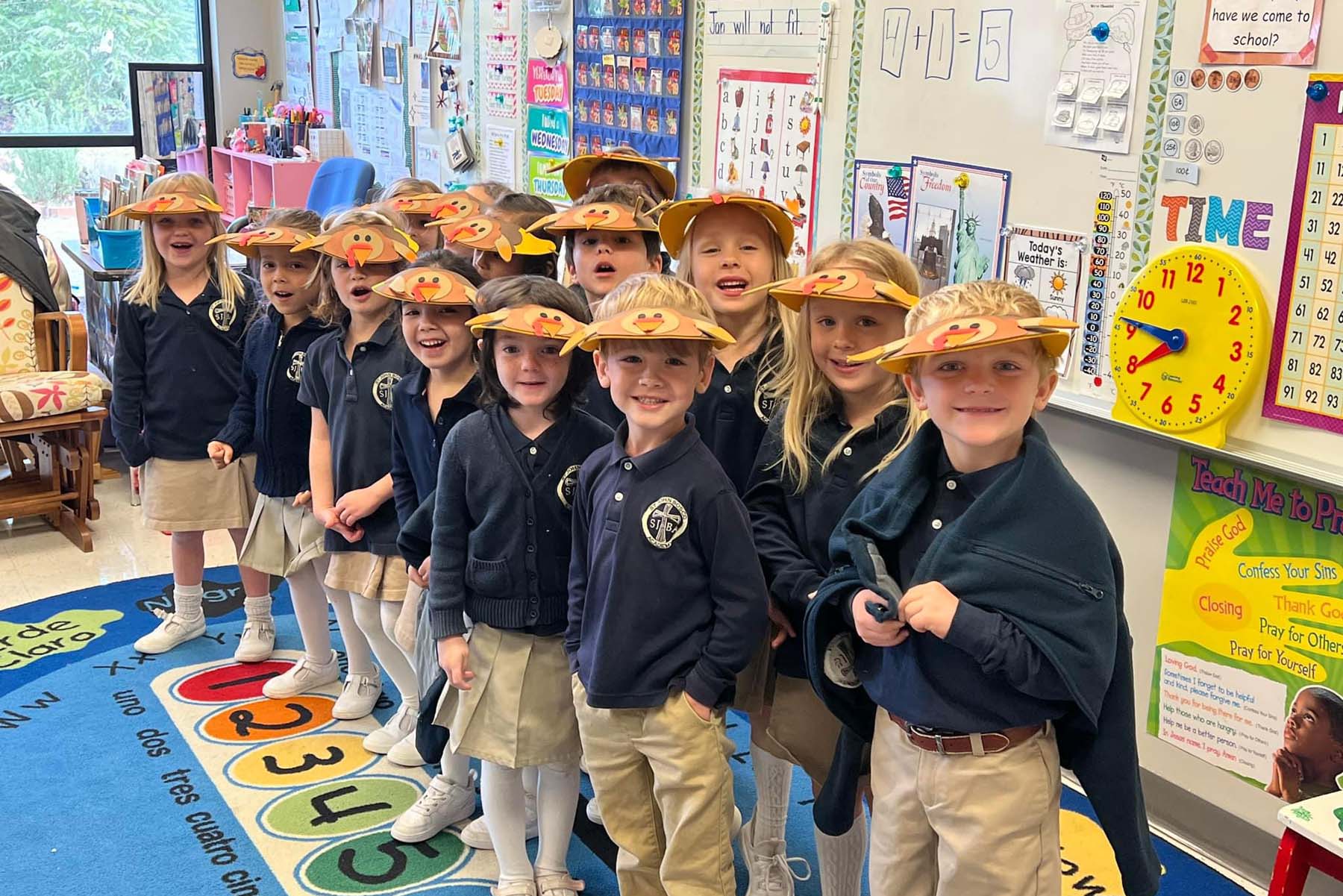Academics
Academics
The goal of our academic program at SJBA is to teach our students, in the words of St. Thomas Aquinas, “how to order things rightly and judge them well.” We utilize content-rich, teacher-led materials across the core subjects that are designed to inspire students to think critically and problem solve, rather than to simply memorize information. We employ the stages of the classical trivium– grammar, logic, and rhetoric– which correspond to the stages of human development, with the ultimate ends being the cultivation of wisdom and virtue.

Grammar Stage
Grades PK4 – 4th
In Pre-K4 and Kindergarten, students are offered a rich curriculum of songs, chants, poetry, music, stories, puppetry, art, and hands-on activities, aimed at introducing the true, good, and beautiful to tiny minds in a myriad of ways. Students are guided by loving teachers in a wholesome environment. Numbers and letters are introduced, and Catholic prayers are memorized. The afternoon is spent with outdoor activities and games. At this age, students’ hearts and minds are like little buckets that are beginning to be filled, and we strive for the classroom to be an extension of home life.
Students in Grades 1-4, are offered a curriculum centered around fostering their natural curiosity and sense of wonder. Students focus on memorizing math facts and phonograms as foundations for further knowledge. They are encouraged to ask questions and are provided with ample opportunities to do so in the classroom. Literature is read aloud in class and explored through early Socratic discussions. Beginning grammar and writing are introduced and fostered. Students become acquainted with science, history facts, and timelines, and they learn about important people who have shaped the foundation of the United States. The Catholic faith formation in these grades spans truth in the Catechism of the Catholic Church, knowledge about Sacramental preparation, and virtue that always points to truth, goodness, and beauty.

Logic Stage
GRADES 5th-8th
Students in Grades 5-8 have entered the logic stage of development. At this stage, students are naturally inclined to question the reason behind everything they are learning. They seek to express themselves through argumentation and are beginning to make sense of all of the knowledge they acquired during the grammar stage. These students have begun to think critically, and the curriculum is designed to introduce them to ideas that they will be able to discuss. In math, for example, once a student has memorized a formula, he or she will now take that knowledge and be able to use it in many different situations. In language arts, the student who already reads and writes will begin to analyze what to write with a much deeper thought process. All of the information these students have gathered in history, science, and religion will now be thought about and discussed critically. Thus, logical connections will be made. The why in each assignment is generally answered, and truth, goodness and beauty are still at the helm of every subject. At the end of this logic stage, students will be ready to express themselves further, and the curriculum and teaching methods support the progression to the rhetoric stage.

RHETORIC STAGE
GRADES 9th-12th
“It is absurd to hold that a man should be ashamed of an inability to defend himself with his limbs, but not ashamed of an inability to defend himself with speech and reason; for the use of rational speech is more distinctive of a human being than the use of his limbs.” -Aristotle
Students in Grades 9-12 have entered into the rhetoric stage. Rhetoric is the art of expression, and the goals of the curriculum and methodology are for students to develop the ability to express themselves eloquently, persuasively, and effectively by drawing on all previous knowledge. Students are taught to construct an argument, organize their points and supply evidence to support their claims. They then evaluate what they have crafted and are able to present their findings through writing and oral presentations. Students are always oriented toward the true, good, and beautiful and are given ample opportunity to discuss each subject, with the goal of building virtue. Whether they pursue college, missionary work, or specific vocational work, students are prepared for success in every way.
